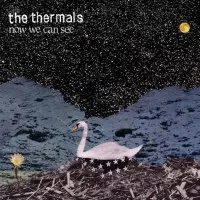2004's Fuckin A was the first Thermals record I heard when my wife (then-girlfriend), who was the manager at our small college's radio station, received it from Sub Pop to add into rotation. I was intrigued by the obnoxious cover art and title and even more intrigued by the lovably-obnoxious feedback and bash-'em-out anthems contained within. The record was a blast, but I thought that formula might wear thin quick. Luckily, we stuck with âem and picked up 2006's The Body, The Blood, The Machine, which turned out to be the âthinking man's Thermals' with deeper lyrics and, more importantly, a bigger scope of tempo, dynamics and feel. It ended up being one of my favorite records of the year. There is just something about the band that makes them so much more likeable than the sum of their simple parts.
With each passing record since the scrappy punk-fueled pop of 2003's More Parts Per Million, the Portland rockers have been stripping away another layer of noise in favor of melody. Now dubbing themselves âpost-power-pop' ("Because adding âpost-' to any genre automatically makes your music sound smarter"), I'm going to have to agree with that label, because hell, the title track has a chorus consisting of guitarist Hutch Harris and bassist Kathy Foster singing in unison "Oh-way-oh-a-whoa" over a bouncy mid-tempo beat; it's poppy yet powerful, and uh, smart! I'm all about it.
With a new drummer Westin Glass (though Foster drums solidly on the album they laid down prior to grabbing him) and in their move to Kill Rock Stars, we see the Thermals constantly evolving, but opening Now We Can See is "When I Died," a tale of attempted devolution and death. Death and illness dominate the album's lyrics, but the band informs us in a SXSW interview for SPIN that it's not a sad record. Foster tells us it's "from the perspective of someone who's died and reflecting back on their life" while Harris just says that "love and death are the most classic themes of songwriting" and so they wanted to step away from the politics and religion of TBTBTM and get back to basics, so to speak. "If life was short / at least it was short" Harris barks from the back of the studio in the song's bridge.
"When I Died" will have you singing about "losing your spine" in no time, but it's catchy not in vocals alone, utilizing a sweet guitar line like those introduced to the band's sound on TBTBTM tunes like "Pillar of Salt." Next up, "We Were Sick" has an undeniable beat, a trebly lo-fi breakdown with handclaps and an addictive vocal line with Foster joining in with Harris, an previously untapped resource that seems so obvious, especially since Foster sang in their prior duo incarnation (conveniently dubbed Hutch & Kathy).
Now We Can See widens their sonic range further with the seemingly-mellow "At the Bottom of the Sea." With its ringing tom hits and a mix of clean and lightly-distorted guitars, its long setup makes it all the more effective when the song busts open in a wash of crash cymbals and feedback. It's also their longest song yet at 5:44, but they make sure to follow it with the zippiest of the album's tracks, "When We Were Alive."
My only complaint would be that the album is a bit front-loaded, but it's more that the second half is as good if only not as immediate. There's plenty to love from "When I Was Afraid," with its menacing minor verses breaking only briefly for a poppier breakdown and outro, to the unassuming bridge hooks of "I Called Out Your Name" that take you by surprise. "How We Fade" brings things down a notch again with Harris singing the âprettiest' we've yet heard in the verses, joined by Foster for a sing-along chorus with you on backups: "Dreaming of you / Oh-oh! / Oh-oh! / Oh-oh! / And how we fade."
Now We Can See finds the Thermals both evolving and stretching sonic elements while simultaneously tightening up their sound to what they do best, shedding the politics but not dumbing down. A simple concept executed perfectly, the Thermals' sound straddles that line that brings together the punks and indie rockers, to sing together joyfully about sickness and death.
